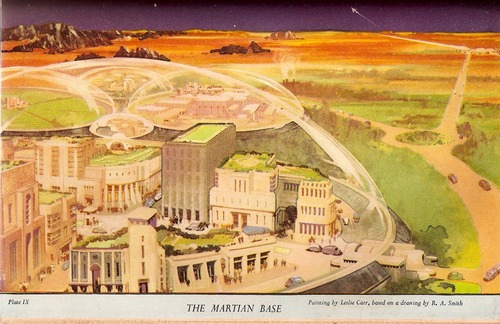Why is it that I don’t believe I’ll ever experience Earthlings colonizing Mars, even if I’m lucky enough to have an average or better lifespan? Is it because it’s a hopelessly complicated and costly mission? Or am I just not able to visualize it because we’ve never accomplished anything nearly that ambitious in our history? I don’t think I’d be so dour about the prospects if the reusable rockets were headed to the moon, if we were going to build domed cities in craters. But I really doubt getting to see the Mars thing.
Elon Musk certainly can imagine it and believes we’ll have accomplished the ginormous leap in the next 25 years. From Tom Yet at the Berkeley Technology Review:
The alternative to a life on Mars lived entirely underground or indoors is terraforming, the transformation of the Martian surface to resemble Earth’s. Essentially, we’ve learned that greenhouse gases ruin the atmosphere and keep temperatures on an ascent, and so a deliberate injection of greenhouse gases into the Martian atmosphere could, in theory, alter its current state of equilibrium and render it hospitable to our species. This process may require decades, even centuries. Given the conditions in the interim, initial settlements would likely need to be constructed by robots. Human pioneers would face a life of extreme austerity.
Musk has said that a million people must settle on Mars before a sustainable civilization can be built. “Even at a million, you’re really assuming an incredible amount of productivity per person, because you would need to recreate the entire industrial base on Mars,” he explained in the Aeon interview. “You would need to mine and refine all of these different materials, in a much more difficult environment than Earth. There would be no oxygen or nitrogen that are just there. No oil.” For now, at least, SpaceX has remained laser-focused on its competitive advantage – space transport – leaving other necessary technological endeavors (as they relate to the erection and maintenance of a Martian civilization) out of their purview.
Who will build the robots that will build up Mars? What will a Martian economy look like? How will politics take form? These, among many other questions, seem unanswered amid the excitement. Continued, long-term inter-organizational cooperation and integration are clearly necessary for substantial gains to be made. Technological advancements aside, setting up a colony aimed at self-sustainability will require not only gargantuan economic investment, but also formidable political will. It’s a leap of faith, and each step along the way will need to break new ground. It’s a journey of precision. Mistake and malfunction could spell not just failure, but also death.•

